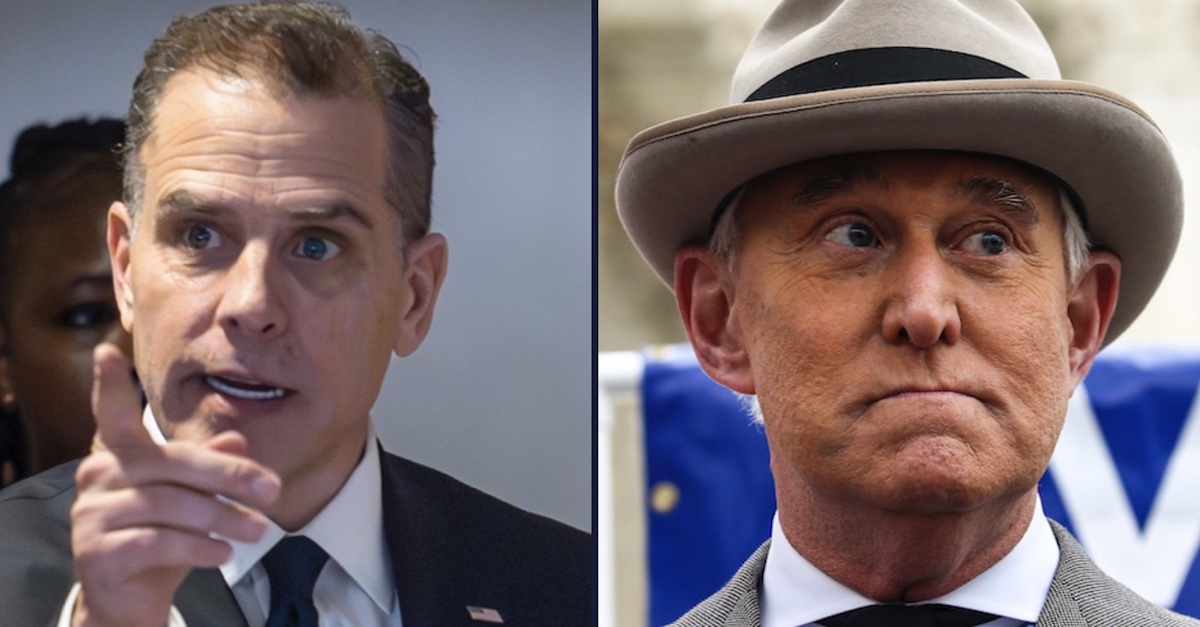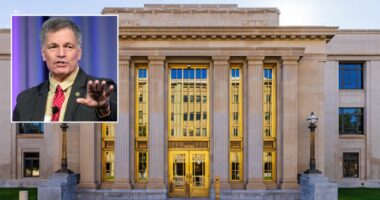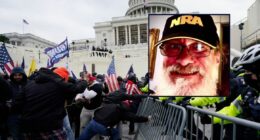Share this @internewscast.com

(Left) Hunter Biden (AP Photo/J. Scott Applewhite), (right) Roger Stone (Photo by Tasos Katopodis/Getty Images)
President Joe Biden’s son Hunter Biden threw eight motions at the wall to dismiss his federal tax prosecution, but none of them stuck, especially his claims of selective and vindictive prosecution.
A federal judge on Monday on the U.S. District Court for the Central District of California denied the myriad motions to dismiss, starting with Biden’s complaint about special counsel David Weiss and the plea agreement that fell apart last year.
After U.S. District Judge Mark Scarsi rejected the theory that the scuttled diversion agreement granted Biden immunity from prosecution, he quickly dispensed with defense arguments that Weiss was unlawfully appointed as special counsel and unlawfully funded. From here, he spent considerable time dismantling the defendant’s claims that he’s being treated differently because other tax cases have been resolved civilly rather than criminally.
One such civil tax case highlighted by the defense involved Donald Trump confidant Roger Stone, but the judge said it was an apples to oranges comparison based on Biden’s alleged “criminal intent” or willful failure to pay “at least $1.4 million in self-assessed federal taxes he owed for tax years 2016 through 2019.”
“In essence, Defendant argues that because most people do not suffer criminal charges for failing to pay taxes on time, he should not either,” Scarsi wrote. “But adopting Defendant’s position would ignore the numerous meaningful allegations about Defendant’s criminal intent that are not necessarily shared by other taxpayers who do not timely pay income tax, including the Shaughnessys and Stones.”
The judge said that Biden’s attempt to show he and Stone were “similarly situated” is clearly undercut by the differences in the allegations involved.
“Nothing in the record of the civil cases, let alone in the circumstances of the ‘countless others’ the Government declines to prosecute, provides an inference that these individuals are similarly situated to Defendant with regard to indicia of criminal intent,” Scarsi wrote. “Obviously, Stone and Shaughnessy were civil cases; intent was not a material element of the nonpayment counts at issue.”
Nor did Hunter Biden’s “rhetorical” appeal to former Obama administration U.S. Attorney General Eric Holder’s CNN appearance last December help advance his selective prosecution claims.
“If anything, Mr. Holder’s statements suggest he holds an opinion in tension with Defendant’s: Mr. Holder expressly declined to state that Mr. Weiss was ‘doing anything inappropriate,’ and he noted that Defendant’s actions went beyond ‘some kind of ordinary run-of-the-mill tax case,”” the judge said. “None of this amounts to the kind of clear evidence necessary to support Defendant’s claim of selective prosecution.”
The judge also said the defense had “only conjecture” to support their “thin” circumstantial claims that “animus” — i.e., vindictiveness — played a role in the indictment, no matter what House Oversight Committee Chairman Rep. James Comer, R-Ky., has said to take credit for the prosecution.
“For example, Defendant makes much ado about Messrs. Comer and Smith’s public statements about the case, inferring that their actions in Congress influenced the course of the prosecution. Mr. Comer even claimed the charges would not have been brought if not for ‘whistleblower’ testimony before the House Oversight Committee,” the judge said. “But politicians take credit for many things over which they have no power and have made no impact. As counsel conceded at the hearing, just because someone says they influenced a prosecutorial decision does not mean that they did.”
Biden’s stitching together of news articles and statements from “congressional proceedings” to create a “juicy timeline” of events fell far short of what was needed to dismiss the indictment on these grounds. The judge cited a Ninth Circuit case that rejected an “appearance-of-vindictiveness claim resting on ‘nothing more than the post hoc ergo propter hoc fallacy.’”
Scarsi said he wouldn’t sign off on a motion technically supported by “virtually no evidence” to okay discovery on this issue.
The judge similarly rubbished Hunter Biden’s claims that the case had to be tossed based on IRS whistleblowers Gary Shapley and Joseph Ziegler disregarding grand jury confidentiality and disclosing his tax return information publicly. Though Biden maintained these actions rose to the level of “outrageous government conduct,” Scarsi said not so fast.
The judge, a Trump appointee, also rejected Biden’s challenge of the case venue and a challenge of the indictment for failing to state a claim.
Read the order here.















